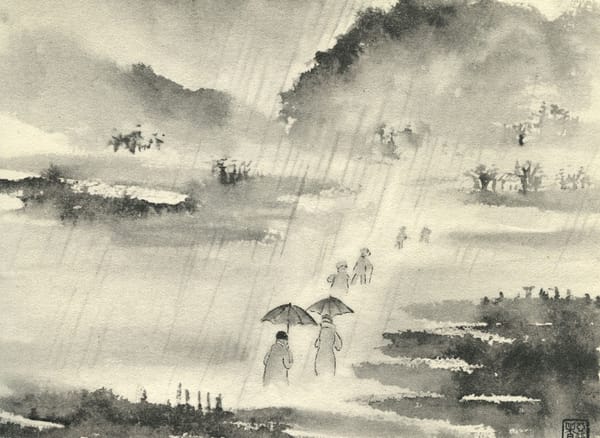Tertium quid nimis: Shoe Drops on Sentinel
"A great master says that his breaking-through is nobler than his emanation, and this is true." ~Meister Eckhart, Sermon 87

We are, more than ever, media suspended across one "big if true" moment after another. Breakthroughs in policy occur mainly when no one can figure out what the hell is happening, so all involved are obliged ever to rebuild their reality around the latest plot twist with whatever plausible interpretation lies painlessly ready to hand. The continuity is a cognitive completion—a Gestalt—not an objective picture theoretically "there" as the situation's substrate.
The neo-retromodernist's critique of increasingly common procedures as "fake" fails to land, since a liquid-modern audience's sphere of concern is only whether the latest move takes—congeals, for the time being, qua Umwelt-structuring event. Under such queer conditions, politics assumes the look of an improv game (e.g., "Yes, and")—except that some "players" confront a breakdown in received technique, awkwardly caught on the back foot when committed to running some model of authenticity: a legacy operating system in which stable intentions, as habituated through careful discipline, can be charged with trumping appearances rather than vice versa.
It is possible—and therefore at once actual—that one is empowered to "be authentic" by running an emulator within the new system, residually romanticizing "the self" as organic growth from hidden depths or as an essence distilled once any appearances are "stripped away," "liberating" a purified subject to behave just as it would were none but itself watching. This image is an intentional failure to capture how actual selfhood—porous, though let us pretend it is buffered—comes to light within a continuous, dynamic intersubjective negotiation.
Our mode of producing self-and-other—and knowledge itself, under liquid modern conditions—leaves no viable option except to recognize sincere pretending as a behaviour of verisimilitude with actual causal efficacy to alter conditions in the simulacrum. I am as free to like this or not—or, glasslike, to receive the stain of affective colouring beyond kneejerk "yah boo" spectatorship—as with the weather. This matrix of meaning-making that being is is attributable not to the ingenuity or mendacity of a single drama-prone man of the hour, but to the world-historical disclosure and shamelessly open exploitation of an already long-latent potential. I don’t say it is good, only that it is . . .





